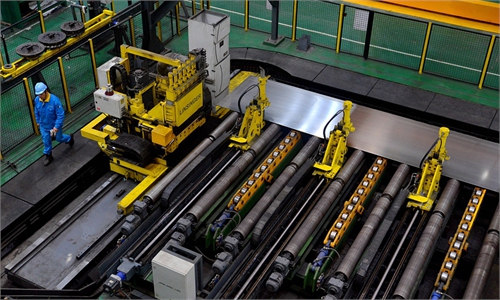
A staff member presents glasswork via livestreaming at a company in Hejian City, north China's Hebei Province, Feb. 11, 2023. Photo: Xinhua
China's private economy, which contributes the lion's share of its GDP and tax revenue, has shown great resilience as China emerges from the COVID impact, and heavyweights are showing confidence in the nation's future development.Although there are some concerns regarding the status of the private sector, Chinese experts said that there is no reason to be pessimistic, given favorable policies from the central and local governments, and the upcoming two sessions will show care for its development, especially for the internet-based platform economy and real estate industry.
And, the auto industry is in a period of innovation with many opportunities.
"As a private enterprise, we are not afraid of competition and we will march ahead," Luo Hao, assistant general manager of BYD, told the Global Times on Thursday. "We are full of confidence in the future development of the new-energy vehicle market and the industry as a whole."
"Upgrading of home appliances has given us the greatest confidence in stable development, and every promising company is believed to have confidence in its future development," said Dong Mingzhu, a deputy to the National People's Congress and chairwoman of Chinese home appliance giant Gree Electric Appliances, according to people.cn.
Such remarks came ahead of the two sessions, which is believed to follow the spirit of the previous key meetings on the private economy, Chinese experts said, noting that Chinese governments from the central down to local levels have expressed their support for the healthy development of the private sector and a swift economic recovery.
China will unswervingly deepen economic reform and focus on solving prominent problems faced by private enterprises in order to promote the growth of the private economy, said a leading official of the country's top economic planner in January.
A report of the 20th National Congress of the Communist Party of China released in October said that it will provide an enabling environment for private enterprises, protect their property rights and the rights and interests of entrepreneurs in accordance with the law, and facilitate the growth of the private sector.
Multiple provinces such as Zhejiang, Shaanxi and Henan have also demonstrated their support through concrete actions.
The Shanghai government said on January 29 that it will optimize the environment for the development of the private economy, and implement policies and measures to support all types of market entities to equally enjoy the support policies.
However, there are still doubts on the status of the private economy. Bloomberg reported last month that China's regulatory crackdowns and a property-market slump had reduced the private sector's share of the country's big businesses for the second successive year.
It is true that the private economy has been hurt due to the continuous economic downturn and insufficient domestic demand, but China has launched support policies in the past half year, and they have gradually had an effect, Wang Jun, an expert at the China Center for International Economic Exchanges in Beijing, told the Global Times on Thursday.
The real estate market will gradually stabilize and rebound in the second half of the year as the impact of the epidemic ebbs, and regulations on the platform economy will ensure its sound development, Wang said.
"We have no reason to be pessimistic about the status of the private economy," he said.
The sales of the top 100 real estate developers totaled 461.56 billion yuan ($66.8 billion) in February, up 14.9 percent on a yearly basis and up 29.1 percent on a monthly basis, according to a report released on Wednesday by China Real Estate Information Corp, a provider of real estate information.
With the continuous acceleration of China's economic and social digital transformation, more small and medium-sized enterprises, especially in some key areas, have found new vitality.
In February, the number of orders for electronic components on WeCom increased by 186 percent from the previous month, according to media reports.
Tencent said that a large number of electronic component traders have built a trade ecosystem with the help of corporate WeCom's ability to connect upstream and downstream firms.
Wang Yu, a member of the 13th National Committee of the Chinese People's Political Consultative Conference, China's top political advisory body, who is also board chairman of Spring Airlines, has proposed to regulate the market environment and business environment for the healthy development of private enterprises in a legal form.
The proposal which the Global Times obtained called for promoting the removal of institutional barriers that restrict private enterprises from participating in market competition fairly, and implementing equal treatment of state-owned and private enterprises in the system and law, as well as treating them equally in resource allocation.
China's private enterprises increased from 10.85 million in 2012 to 44.57 million in 2021, Su Wei, deputy secretary general of the National Development and Reform Commission, said in June last year, according to the Xinhua News Agency.
The private sector contributes more than 50 percent of tax revenue, more than 60 percent of GDP and over 70 percent of technological innovations. It also provides more than 80 percent of urban employment and accounts for more than 90 percent of market entities in China.




